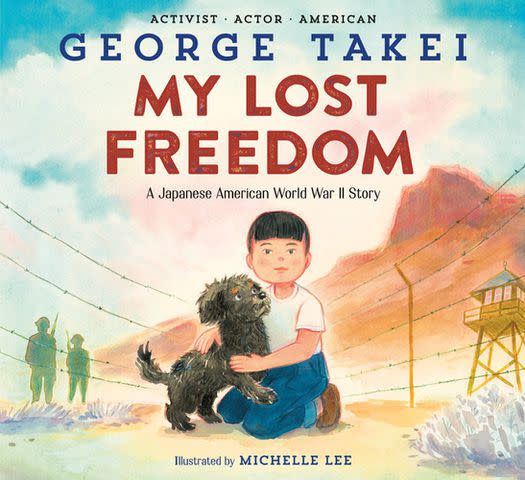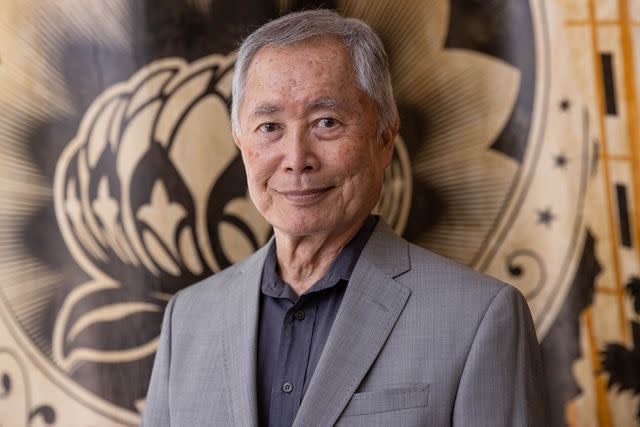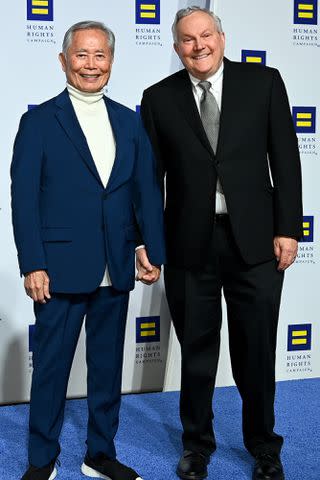George Takei Recalls 'Laughing and Crying' As He Wrote About His WWII-Era Imprisonment In New Book (Exclusive)
- Oops!Something went wrong.Please try again later.
The 'Star Trek' icon and self-described “emotional guy” tells PEOPLE about writing his new children’s book 'My Lost Freedom'

Slaven Vlasic/Getty; Penguin Random House
George Takei's new book 'My Lost Freedom'For George Takei, writing My Lost Freedom was an emotional experience that left him “laughing and crying,” he says.
The Star Trek icon recounts in his new children’s book how he, his siblings and his parents were forcibly removed from their California home and imprisoned on American soil during World War II after Japan bombed Pearl Harbor, the event which brought the U.S. into the war.
Even though Takei and his family members were U.S. citizens, “America saw us as the enemy simply because we looked like the people who did the bombing,” writes the actor, who was just one of more than 100,000 Japanese Americans to suffer the same fate.
Takei has covered this topic before in his 1994 memoir To the Stars and the 2019 graphic novel They Called Us Enemy. But he wanted to explore the subject in a children’s book to reach a new audience.
Related: George Takei's Life in Photos
“It's an American story because it's a chapter of American democracy, and yet so many Americans either know absolutely nothing about it or whatever they know is rather skimpy,” he tells PEOPLE. “It's so shocking to me that an event so important to the idea of American democracy is so little-known.”

Penguin Random House
'My Lost Freedom' by George TakeiEven descendants of the imprisoned are sometimes unaware of their family history, according to Takei. “The generation that went through that experience were so wounded by it and also felt so shamed by it, which is actually not their shame," he says. "The shame is that of the governments because they're the ones that acted in such an irrational and cruel and undemocratic way.”
“But one unfairness of life is that the victims of that shame, governmental shame, are the ones who take on that shame and they didn't talk about it with their children or their grandchildren,” he explains.
My Lost Freedom, says Takei, “tells a very elementary story, but maybe even on that elementary level, it puts the curiosity of daddy and mommy to learn a little bit more about it. And for their children, they are introduced to that story.”
The actor was just four years old when U.S. soldiers took the Takei family from their Los Angeles home and moved them into temporary housing at the Santa Anita racetrack where they slept in horse stalls filled with “bugs, flying insects and germs,” writes Takei.
The family was later moved to a more permanent prison camp in Arkansas.

Emma McIntyre/Getty
George Takei in 2021They were scared, but also resourceful. Takei’s mother snuck in a portable sewing machine (which Takei says was “forbidden”) so she could make clothes for her kids and curtains for their tiny dwelling, one of many on the prison grounds, which was surrounded by barbed wire.
“When she revealed it in Arkansas, my father was aghast. He couldn't believe she had brought in contraband: ‘What’s going to happen to us if they find it?’” recounts Takei.
Related: 5 Times George Takei Won Facebook
All the tension and fear that built up broke with a brief moment of levity. Takei’s father, “started laughing. He burst out into guffawing, and my mother joined in with him” recalls the actor. “In remembering that, I started laughing and crying too at the same time. The pain, the kind of emotions that my parents had to go through, they just made me cry.”

Shannon Finney/WireImage
George Takei and his husband Brad Takei in 2022The book, illustrated by Michelle Lee, recounts other emotional moments, including how Takei learned to say the Pledge of Allegiance while surrounded by barbed wire and soldiers on guard.
In 1945, after roughly four years in the camp, the Takeis—and all the other Japanese Americans who were rounded up—were let go when World War II ended. “Suddenly the government was releasing us from camp as abruptly as we had been imprisoned,” writes Takei, who has been wed to his husband Brad Takei since 2008.
But the family (and many others) “had nothing because the U.S. government had taken everything,” he continues. They were given $25 each and a “one-way ticket to anywhere in the United States.”
The Takeis returned to Los Angeles and started over.
But rather than ignore what happened to them, Takei’s parents discussed their imprisonment with their children. “I had many after-dinner conversations,” says Takei. “I wanted to understand it.”
Now a new generation can understand it, too.
My Lost Freedom: A Japanese American World War II Story is available now.
For more People news, make sure to sign up for our newsletter!
Read the original article on People.

